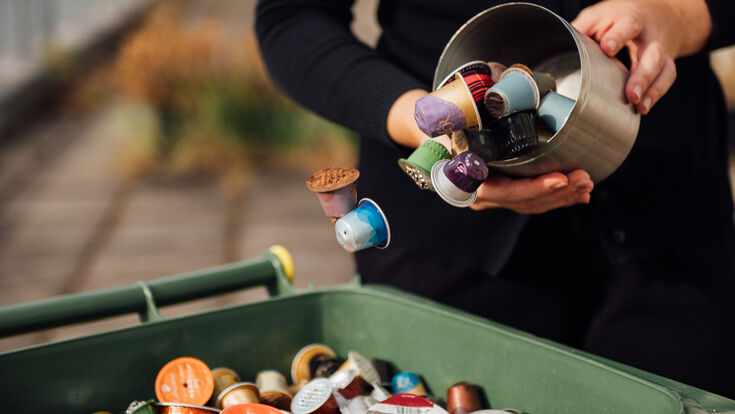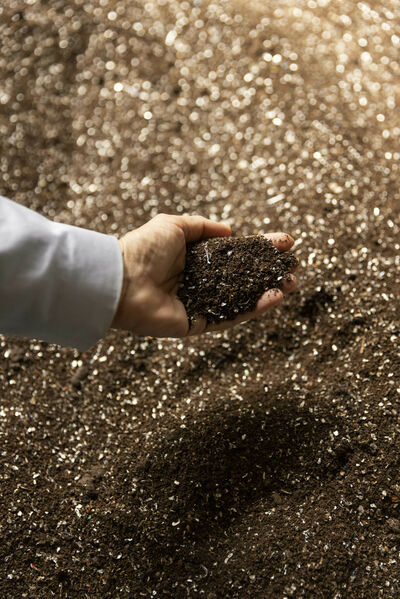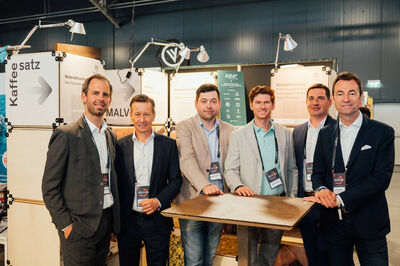Over 120 tonnes of coffee pods collected : Coffee capsule recycling pilot project extended due to success

They are small and they are practical: Coffee capsules. The colorful little pods currently account for around 10 to 15 per cent of global coffee consumption. This market share has grown steadily in recent years as the demand for convenient and high-quality single-dose coffee systems has increased. But - well, there is always a but, isn't there - they come with a price. Because they are after all just another single-use product.
The production, packaging (aluminium production is particularly energy intensive), and transportation of coffee capsules consume more energy compared to traditional coffee brewing methods. As they consist of a mix of materials, e.g., plastic, aluminum, and organic coffee grounds, they are hard to recycle. And while some brands do have recycling programmes, the participation rate is generally low. So most capsules end up in waste-to-energy plants or landfills.
For that reason the Austrian Coffee and Tea Association (Österreichischer Kaffee- und Teeverband, KTV) and Altstoff Recycling Austria AG (ARA) launched a pilot project to separately collect and recycle coffee capsules of all brands, which is unique in the EU.
Related article: Pilot project to easy collect and recycle coffee capsules
Capsule recycling has great potential
The figures prove its success: from October 2023 to March 2024, a collection volume of 120.33 tonnes (9.1 million capsules) was achieved in the pilot regions of Upper Austria, Krems-Land and Schwechat, an increase of 22 per cent across all locations. Due to its great success, the pilot project has been extended until the end of June 2024. ‘The positive outcome of our coffee capsule recycling project with ARA, in which manufacturers, retailers and the packaging industry are involved, shows the incredible leverage we are creating with a strong alliance. The motivation to participate and collect on the part of consumers proves the enormous potential that innovative and circular solutions have for Austria's circular economy,’ says Paul Unterluggauer, Vice President of the Austrian Coffee and Tea Association.
The coffee pod recycling project raises awareness among the general public and partners along the entire value chain. ARA CEO Harald Hauke is convinced: ‘By making consumers aware of how many valuable raw materials are contained in a single small coffee capsule and the impact of correct collection, we are taking a significant step towards conserving resources. The 22 per cent increase in collected coffee capsules shows how well our coffee capsule recycling project has been received. With projects like these, we are offering the industry new raw materials.’
The collected capsules are processed at the new SECCON recycling plant in Pettenbach, Upper Austria: Coffee and capsules are separated and processed into valuable raw materials. The colourful capsules are converted back into pure aluminium or plastic for new products. The coffee grounds are suitable for use as bio-fertiliser, oil binding agent, biogas or even for the production of new furniture, as a research project by ARA in cooperation with the Salzburg University of Applied Sciences - Campus Kuchl shows.
Related article: How well do Products advertised as compostable decompose?

Industry and retail draw positive conclusions
The pilot project met with broad approval in the 16 Billa Plus stores in Upper Austria, reports Stephan Kern, Circular Economy Manager at REWE Austria: ‘Those who separate coffee capsules correctly not only protect the environment, but also save valuable raw materials. The pilot project was well received by consumers and confirms the growing demand for environmentally friendly solutions.’
Capsule manufacturers Constantia Flexibles and Greiner Packaging have also been on board since the start of the year. The producers are thus laying a valuable foundation for the subsequent recycling process and making an important contribution to cross-industry cooperation with their expertise.
‘In the spirit of a strong circular economy for Austria, we are focussing on a holistic approach along the entire packaging value chain. We are therefore particularly pleased that we were able to contribute our expertise as a capsule manufacturer to this pilot project and create new products from the collected aluminium capsules,’ says Thomas Schulz, Vice President Group Marketing & Communication Constantia Flexibles.
‘Greiner Packaging has been successfully producing plastic packaging for the coffee capsule market for many years. This makes it all the more important for us to develop packaging solutions that are as sustainable as possible. With the coffee capsule recycling project, we are focussing on innovative approaches and promoting the circular economy,’ explains Rene Berger, Managing Director of Greiner Packaging GmbH.



